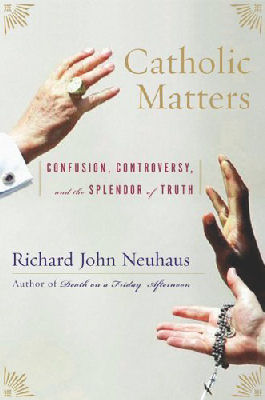
|
Posted May 9, 2006
Book: Catholic Matters: Confusion, Controversy and the Splendor of Truth Author: Richard John Neuhaus Basic Books, New York, 2006. Pp. 260 An Excerpt from the Jacket:
In Catholic Matters, Father Neuhaus addresses the many controversies that have marked recent decades of American Catholicism: the battles over the meaning of the Second Vatican Council, the “destabilizing” of the liturgy, the declining number of priests, and the sexual abuse scandals. Looking beyond these troubles to “the splendor of truth” by which the Catholic Church is constituted, he proposes a vibrant, forward-thinking way of being Catholic in America. Drawing on his personal encounters with the late John Paul II and Joseph Cardinal Ratzinger, now Pope Benedict XVI, Father Neuhaus describes their hope for a springtime of world evangelization, Christian unity, and Catholic renewal. Catholic Matters shows a vibrant Church – one strengthened and unified by hardship – that is on the cusp of a great revival in her spiritual vitality and an even greater contribution of our common life. An Excerpt from the Book: Morality has become almost totally a matter of feelings and preferences. You have yours and I have mine. If I say that something is “wrong,” I am expressing no more than my personal preference. “I am not comfortable with that,” “I feel that is not right.” “I would prefer you not to do that.” in short, the making of arguments is replaced by the expression of emotions. In such a cultural context, the appeal to “conscience” is only an appeal to my personal preference. Conscience, in this view, does not discern moral truth but subjectively establishes the truth. This deep shift in the understanding of conscience and truth is addressed in the 1993 encyclical of John Paul II, Veritatis Splendor (The Splendor of Truth). An extended quotation is in order: Certain currents of modern thought have gone so far as to exalt freedom to such an extent that it becomes an absolute, which would then be the source of values. This is the direction taken by doctrines which have lost the sense of the transcendent or which are explicitly atheist. The individual conscience is accorded the status of a supreme tribunal of moral judgment which hands down categorical and infallible decisions about good and evil. To the affirmation that one has a duty to follow one’s conscience is unduly added the affirmation that one’s moral judgment is true merely by the fact that it has its origin in the conscience. But in this way the inescapable claims of truth disappear, yielding their place to a criterion of sincerity, authenticity and “being at peace with oneself”, so much so that some have come to adopt a radically subjectivistic conception of moral judgment. As is immediately evident, the crisis of truth is not unconnected with this development. Once the idea of a universal truth about the good, knowable by human reason, is lost, inevitably the notion of conscience also changes. Conscience is no longer considered in its primordial reality as an act of a person’s intelligence, the function of which is to apply the universal knowledge of the good in a specific situation and thus to express a judgment about the right conduct to be chosen here and now. Instead, there is a tendency to grant to the individual conscience the prerogative of independently determining the criteria of good and then acting accordingly. Such an outlook is quite congenial to an individualist ethic, wherein each individual is faced with his own truth. Taken to its extreme consequences, this individualism leads to a denial of the very idea of human nature. These different notions are at the origin of currents of thought which posit a radical opposition between moral law and conscience, and between nature and freedom. Table of Contents: 1. The Church we mean when we say “Church” 2. Becoming the Catholic I was 3. The authority in question 4. Where the sweet birds sang 5. Lest Catholics be different 6. Proposing the story of the world 7. The center holds 8. Rome diary |
|
